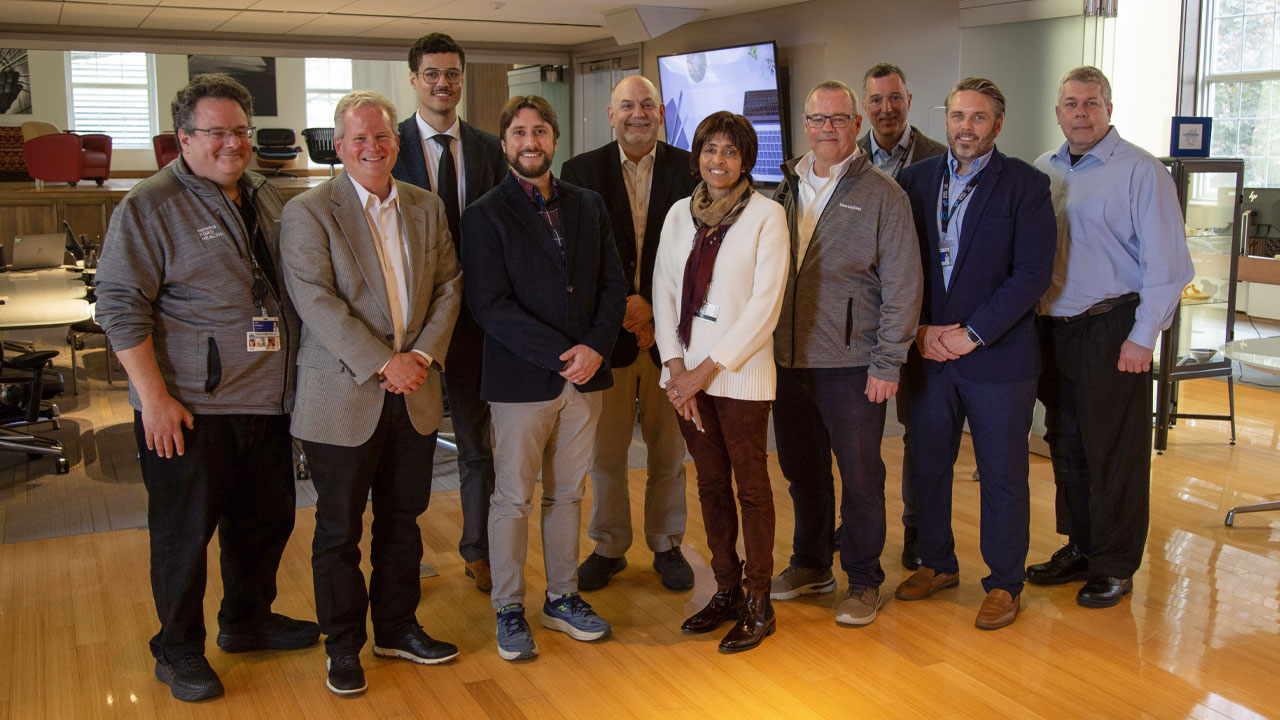SHARE
November 25, 2025
Inside the Innovation Hub Turning Healthcare Ideas into Real-World Impact

Built by Henry Ford Health and the MSU Research Foundation, a new Innovation Hub is connecting clinicians and startups to turn ideas into better patient care.
Two decades ago, a Henry Ford surgeon did something unconventional. He adapted an early-generation robotic system that had struggled to find clinical traction for a different type of procedure.
The results were transformative and helped launch a multibillion-dollar market for robotic surgery, but Henry Ford Health saw none of that value.
“That’s when we realized we needed a better pathway to advance and protect our own innovations,” says Lisa Prasad, vice president and chief innovation officer at Henry Ford Health. “We had been giving away intellectual property that was making a real impact, but without a system to capture that value and reinvest it in patient care.”
That realization became the seed of something bigger—a movement to make innovation part of the health system’s DNA.
The Problem: Innovation Without a Pathway
Healthcare generates endless ideas from clinicians, researchers, and startups, but most of them never reach patients.
“Health systems can’t do business as usual,” Prasad says. “We need innovations that make care faster, better, and more humane, and we need them to come from inside the ecosystem, not just from outside disruptors.”
It’s not just a matter of efficiency. By 2035, there will be more Americans over the age of 65 than under 18. The imbalance between patients who need care and providers who can deliver it is widening every year.
For Prasad, who began as an English major before becoming a business strategist and ultimately finding her way into healthcare innovation, the challenge is to create meaningful connections. “I’ve always been drawn to how large, trusted institutions can open themselves up to collaboration,” she says. “That’s where real change happens.”
The Partnership That Changed the Equation
In 2021, Henry Ford Health and Michigan State University signed a 30-year academic collaboration to align research, education, and clinical excellence.
Soon after, Prasad met Jeff Wesley, executive director of venture at the MSU Research Foundation. His team had deep experience helping early-stage startups form, fund, and scale, and he saw in Henry Ford a perfect partner to test new ideas in real clinical settings.
“We rolled up our sleeves and started running pilots,” Wesley recalls. “In less than two years, we had 18 active projects. It wasn’t theory—it was companies, clinicians, and data working together.”
Those early projects became the foundation for the Henry Ford Health + MSU Innovation Hub, a new model for collaboration where ideas can move from concept to clinic faster and take root in Michigan.
One Startup That Shows What’s Possible
When a team of MSU biomedical engineering doctoral students teamed up with a surgeon at Henry Ford Health, they weren’t chasing a startup dream. They were trying to solve a simple, frustrating problem in the operating room.
During laparoscopic procedures, surgeons often struggle to indicate anatomy to their teams without breaking sterility or pausing the operation.
Their idea was elegant in its simplicity: a laser pointer mounted on headgear, activated by a foot pedal, allowing surgeons to “point” hands-free during surgery.
That concept became LaparAssist, Inc., a company born inside the partnership between Henry Ford and Michigan State.
With support from the Innovation Hub, the team filed a patent application for the device and launched the company. It’s now being used to improve surgical communication and training, turning an everyday challenge into a safer, smarter process.
“LaparAssist captures what this partnership is about,” Prasad says. “Clinicians identifying real problems, researchers and students co-creating solutions, and the system helping bring them to life.”
From Collaboration to Capital
The Hub’s early success led to a bold next step: a $10 million joint venture fund, backed by Henry Ford Health, Michigan State University, and the MSU Research Foundation.
The fund invests directly in technologies emerging from the Hub, from medical devices and diagnostics to AI-driven tools, ensuring that promising ideas can come to Michigan for incubation and launch.
“It’s a challenging economic climate,” Prasad says. “For both institutions to commit to a fund like this shows how much we believe in the value of building here, together.”
The model is already attracting global attention. Startups from Israel, Ireland, and Central Europe are exploring Detroit as a landing point for U.S. expansion, drawn by the Hub’s combination of venture funding, clinical access, research depth, and startup expertise.
“For a company to choose Detroit over the coasts, that tells you something,” Wesley says. “They see the momentum here.”
The Vision: Building the Future of Care in Detroit
The next phase of the partnership will take shape in Detroit, where the new Henry Ford Health + MSU Research Building will anchor the city’s growing innovation corridor.
“If we do this right,” Prasad says, “Detroit becomes a destination for companies that want to test, refine, and launch technologies that truly improve patient lives.”
For Wesley, the motivation goes beyond metrics. “Healthcare gives you psychic income,” he says. “You can literally change lives. That’s what makes this work so rewarding.”
Prasad agrees. “The future of healthcare isn’t about technology for its own sake,” she says. “It’s about patients who want care that fits their lives and clinicians who want to spend more time healing and less time clicking boxes.”
Get Involved
The Henry Ford Health + MSU Innovation Hub welcomes venture firms, accelerators, and corporate partners interested in developing and commercializing transformative healthcare solutions.
Learn more or connect with the team at henryfordmsu.org/innovation.
Latest Posts
February 17, 2026



